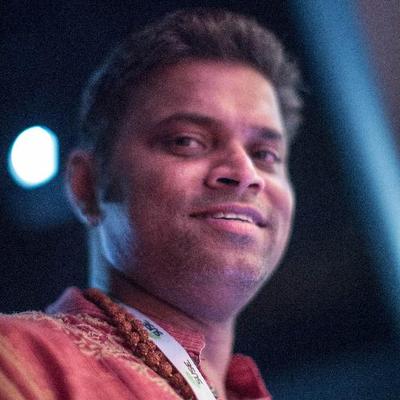 Mission control on earth receives an urgent communication from Mars that an astronaut has fractured his shinbone. Using a handheld scanning device, the crew takes images of his damaged tibia and transmits them to earth. Orthopedic surgeons then use a 3D printer to create an exact replica of the astronaut’s leg from medical imaging files obtained before the voyage. Surgeons on earth use a robot to stabilize the bone with a metal plate on the 3D replica. The data is transmitted back to Mars, where surgical instruments, a personalized plate and screws are 3D printed. Finally, a surgical robot operates on the injured astronaut...
Mission control on earth receives an urgent communication from Mars that an astronaut has fractured his shinbone. Using a handheld scanning device, the crew takes images of his damaged tibia and transmits them to earth. Orthopedic surgeons then use a 3D printer to create an exact replica of the astronaut’s leg from medical imaging files obtained before the voyage. Surgeons on earth use a robot to stabilize the bone with a metal plate on the 3D replica. The data is transmitted back to Mars, where surgical instruments, a personalized plate and screws are 3D printed. Finally, a surgical robot operates on the injured astronaut...
Africa
See the following -
12 Ideas To Improve Development Research Access And Uptake
Our expert panel suggests how to ensure that research is open, accessible and still of high quality Read More »
- Login to post comments
2015 Resolution: Accept That Diseases Hop Borders, Don’t Dismiss Them, And Don’t Panic
...There’s no question that the big public health story of 2014 was Ebola. The African epidemic has now racked up more than 20,000 cases, according to the World Health Organization, which has put together a useful map and timeline of developments since March...
- Login to post comments
30 Brilliant African Tech Startups
The secret is out. Wired likens the opportunities in Africa to those of the pre-dotcom boom in 1995. Says the magazine: “If you want to become extremely wealthy over the next five years, and you have a basic grasp of technology, here’s a no-brainer: move to Africa.” Read More »
- Login to post comments
30 Most Promising Young Entrepreneurs In Africa 2014
There has never been a more inspired generation of young Africans. These builders, innovators and risk takers are fervent in their resolve to transform the continent. They are solving critical socio-economic problems, exporting African culture to the world, creating job opportunities for Africans, re-telling Africa’s stories, and writing the future. Read More »
- Login to post comments
3D Design Contest for Medical Tools in Africa
 The moment the open source RepRap 3D printer was created, its potential for helping the developing the world was evident. The distributed digital production of open source appropriate technology can make a real difference. Research in this area has been heating up with numerous applications from the Enabling the Future's prosthetic hands, to the Waterscope microscope, to more mundane things like organic farm tools. The ReFab Dar project hopes to accelerate this trend. It is a pilot program that explores how plastic waste can power entrepreneurship using 3D printers in Tanzania. They have built on the early work done by the Michigan Tech Open Sustainability Technology Laboratory's efforts with open source recyclebots to turn plastic waste into 3D printing filament and then into high-value products...
The moment the open source RepRap 3D printer was created, its potential for helping the developing the world was evident. The distributed digital production of open source appropriate technology can make a real difference. Research in this area has been heating up with numerous applications from the Enabling the Future's prosthetic hands, to the Waterscope microscope, to more mundane things like organic farm tools. The ReFab Dar project hopes to accelerate this trend. It is a pilot program that explores how plastic waste can power entrepreneurship using 3D printers in Tanzania. They have built on the early work done by the Michigan Tech Open Sustainability Technology Laboratory's efforts with open source recyclebots to turn plastic waste into 3D printing filament and then into high-value products...
- Login to post comments
3D Printers: A Revolutionary Frontier for Medicine
- Login to post comments
3D Printing Helps Amputees
Not Impossible, a California-based media and technology company, has embarked on a project to use 3D printing to provide hands and arms for amputees in South Sudan and the war-torn Nuba Mountains. Read More »
- Login to post comments
3D Printing Prosthetic Limbs: How 'Project Daniel' Is Revolutionizing Healthcare In South Sudan
Daniel Omar was 14-years-old when he lost both of his arms in a bomb attack in the Nuba Mountains of South Sudan. Fast forward two years. Thanks to the innovations of California-based research firm Not Impossible Labs as well as the advancements in 3D printing, Daniel now has his left-arm prosthetic and is currently helping to print prostheses for others. [...] Read More »
- Login to post comments
6 Ways Programmers from Underrepresented Countries Can Get Ahead
 Becoming a programmer from an underrepresented community like Cameroon is tough. Many Africans don't even know what computer programming is-and a lot who do think it's only for people from Western or Asian countries. I didn't own a computer until I was 18, and I didn't start programming until I was a 19-year-old high school senior, and had to write a lot of code on paper because I couldn't be carrying my big desktop to school. I have learned a lot over the past five years as I've moved up the ladder to become a successful programmer from an underrepresented community. While these lessons are from my experience in Africa, many apply to other underrepresented communities, including women.
Becoming a programmer from an underrepresented community like Cameroon is tough. Many Africans don't even know what computer programming is-and a lot who do think it's only for people from Western or Asian countries. I didn't own a computer until I was 18, and I didn't start programming until I was a 19-year-old high school senior, and had to write a lot of code on paper because I couldn't be carrying my big desktop to school. I have learned a lot over the past five years as I've moved up the ladder to become a successful programmer from an underrepresented community. While these lessons are from my experience in Africa, many apply to other underrepresented communities, including women.
- Login to post comments
A Doctor Leverages Open Source to Learn How to Code And Improve Medical Care in Africa
 Judy Gichoya is a medical doctor from Kenya who became a software developer after joining the open source medical records project, OpenMRS. The open source project creates medical informatics software that helps health professionals collect and present data to improve patient care in developing countries. After seeing how effective the open medical records system was at increasing efficiency and lowering costs for clinics in impoverished areas of Africa, she began hacking on the software herself to help improve it. Then she set up her own implementation in the slums outside Nairobi, and has done the same for dozens of clinics since. This is a classic story of open source contributors, who join in order to scratch an itch. But Gichoya was a doctor, not a programmer. How did she make the leap?
Judy Gichoya is a medical doctor from Kenya who became a software developer after joining the open source medical records project, OpenMRS. The open source project creates medical informatics software that helps health professionals collect and present data to improve patient care in developing countries. After seeing how effective the open medical records system was at increasing efficiency and lowering costs for clinics in impoverished areas of Africa, she began hacking on the software herself to help improve it. Then she set up her own implementation in the slums outside Nairobi, and has done the same for dozens of clinics since. This is a classic story of open source contributors, who join in order to scratch an itch. But Gichoya was a doctor, not a programmer. How did she make the leap?
- Login to post comments
A Gathering Of Africa’s Tech Hubs: AfriLab Gathering At Re:publica Berlin
The definite highlight of attending Re:publica was the gathering of African Tech Hubs taking place there, organised by AfriLabs. Having recently appointed a new Director Tayo Akinyemi, their role is to strengthen collaboration between Africa’s tech hubs [...]. Read More »
- Login to post comments
A Grant For Northern Aid
Working with their partner, Christian Aid, Kenyan NGO Northern Aid will soon be trialling an innovative water payment system in north eastern Kenya. Read More »
- Login to post comments
A New Resource For Agriculture
Why is open access to research and other data important? Read More »
- Login to post comments
A Patient In Minnesota Has Lassa Hemorrhagic Fever. (Don’t Panic.)
News from the Minnesota Department of Public Health and the Centers for Disease Control and Prevention: A Minnesota traveler returning from Africa has been hospitalized with what the CDC confirms to be Lassa fever, a viral hemorrhagic fever that is often lumped together with Ebola hemorrhagic fever, though they are caused by different organisms. Read More »
- Login to post comments
Access Barriers Relegating Africa To Invisible Research Contributor
The growth of research in Africa and the ability to find solutions to the continent’s problems will remain limited if African academic libraries continued to have restricted access to official research information, Science and Technology Minister Derek Hanekom said on Wednesday. Read More »
- Login to post comments